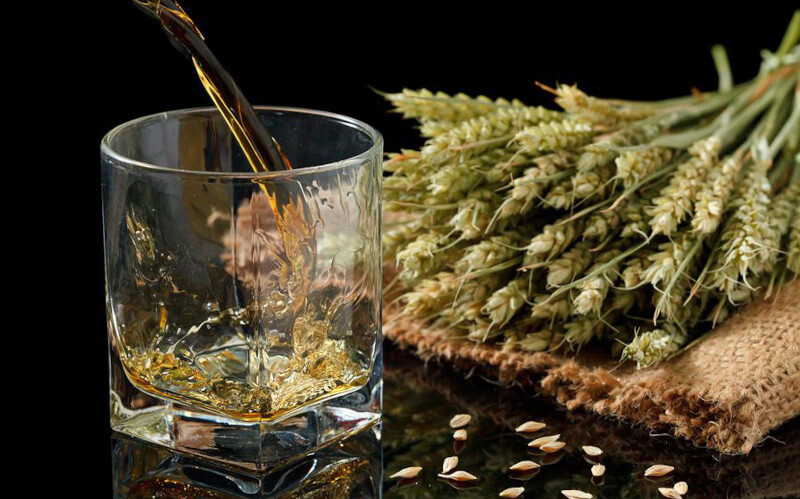If you ask ten people in a room, “What is your favorite whisky?” you will receive ten different responses. A powerful bourbon style may appeal to one person while a sweeter whisky may appeal to another. We’re just wired differently, and there’s no good or wrong in that. There is a dedicated following for grain-to-glass Texas Whisky.
Grain-to-Glass Whiskey
Many small distilleries and breweries boast “grain-to-glass” practices, which means they solely employ ingredients from their area. That is to say, they have spent their entire lives in Texas.
The increased level of control over every step of manufacturing is worth the extra effort and cost, but only if you’re willing to put in the time and effort. The distilleries that make whisky from scratch use local ingredients and resources from farmers and retailers to create a finished product that ultimately ends up in the glasses of whisky drinkers.
All of It Begins With the Grain
Whisky is a type of grain-based distilled liquor. Whisky is typically distilled from one of three grains: barley, rye, or maize. Another popular kind, shochu, is produced from rice rather than malted grains like barley or rye. Since the grain used to make whisky must be delivered fresh, it is typically farmed in the vicinity of the distillery. Many distilleries are well-known for the specific grains they utilize, and every brand has its secret recipe.
Malting is the first step, and it involves soaking the grains in water to promote germination. After being dried in kilns to an appropriate temperature, the grains are ground into a grist in a mill.
The following stage often takes several hours. To extract sugar from the grains and create wort, the grist is mashed with hot water. After the ‘wort’ has been filtered out, it will take the yeast another 48 hours to convert the sugars into alcohol. After the liquid has been fermented, it is distilled to boost the alcohol content. Whisky is created when the vapors of fermenting ethanol are collected and cooled in copper pot stills.
Casks of Whiskey
Whisky maturation can take place in a wide variety of casks. Oak is the most typical, but other trees like chestnut and bamboo have also been utilized.
A lot of flavors from the barrel’s wood can be transferred to the whisky. Scotch whisky, for instance, is commonly matured in American bourbon barrels to impart vanilla and oak notes, while Japanese distilleries have been experimenting with aging their product in Spanish (sherry) casks to create a distinctive flavor profile. The unique flavors imparted by each cask contribute to whiskey’s enduring popularity. Toffee, caramel, tobacco, and leather are all fair game.
Barrel Aging
After distillation, whisky spends at least three years (and typically much longer, depending on the brand) aging in wood casks. Whisky’s color and flavor character, which can range from light and fruity to smoky and peaty, are developed during the aging process in oak casks.
The alcohol is then put into oak casks and aged, maturing, and picking up additional taste from the wood while it is held in warehouses (often for decades). Depending on the product line, this can take a very long time. As time passes, the whisky absorbs some of the tannins from the cask, making it deeper in color. The whisky is then packaged with information about the distillery, the ABV, and the particular flavor profile. Keep in mind that there is a wide variety of whisky styles from throughout the world, each with its distinct flavor and aroma.
Bottling
The whisky is ready for bottling when it reaches the desired age. While some whiskies are bottled at barrel strength, the majority are diluted with water. Responsible drinkers can relax and enjoy their dram more fully when the alcohol content is reduced to 40% or below.
Whisky is diluted before being bottled with information on the whisky’s origin, flavor profile, and alcohol by volume (ABV). Depending on the quantity, bottling can take anything from a few days to a couple of weeks.
Whisky-making is an intricate process that requires extensive education and practice to accomplish. A high-quality whisky can take a distiller anything from two to six years to make from start to end.
For Those Unfamiliar, What Exactly is Grain Whiskey?

Malted barley, unmalted barley, and other grains like wheat and maize are used to create grain whisky, a type of whisky. Whiskies made from grain are typically blended with other types of whisky to create a new flavor profile.
Defining “Single Malt” Whiskey
Single malt is one of the most common whisky descriptions. This style of whisky is produced in a single distillery using a mash of 100% malted barley. Single malt whiskies have a reputation for being the finest whiskies on the market. Single malt whiskies are created exclusively from malted barley, while blended whiskies use a variety of grains. This enhances the whisky’s flavor and personality tremendously.
Is Grain-To-Glass Superior to Other Whiskies?
Grain-to-glass proponents argue that distilleries may more accurately capture regional flavors by making use of seasonal and locally sourced ingredients in their alcoholic beverages. Using local ingredients naturally results in a one-of-a-kind whisky.
One distillery may employ corn or malt to create a conventional robust bourbon-style whisky, while another may produce a smokey whisky or one laced with peppers, all thanks to the improved control the distilleries have over the process. It takes a lot of work to ensure that this premium whisky is consistent from the distillery to the bottle. This unmistakably artisanal technique requires uniformity of grain selection and attention to detail at every stage.
Should We Care About Grain-to-Glass?
We need to get the word out to whisky sellers so their customers may make educated purchases. The trend of making whisky from scratch, from grain to glass, is gaining traction and receiving widespread acceptance from connoisseurs of the spirit. The simple line is that these Texas-born Whiskies, each with its personality and quirks, offer something special to whisky lovers everywhere.

